Understanding how SEO works is crucial for online visibility. Incorporating search engine optimization (SEO) and search engine marketing (SEM) into digital strategies is essential for businesses aiming to improve their online presence and achieve higher organic search results.
Content marketing is also crucial for enhancing online visibility. By understanding the fundamentals of SEO, businesses can improve their website’s ranking on search engine results pages and attract more organic traffic through effective backlinks, keyword research, and content marketing in their digital marketing strategy. This blog post will guide you into the fundamental principles of search engine optimization (SEO), emphasizing its significance in today’s digital landscape, particularly in organic search and content marketing. It also discusses the importance of guest blogs in SEO strategies.
Understanding How SEO Works
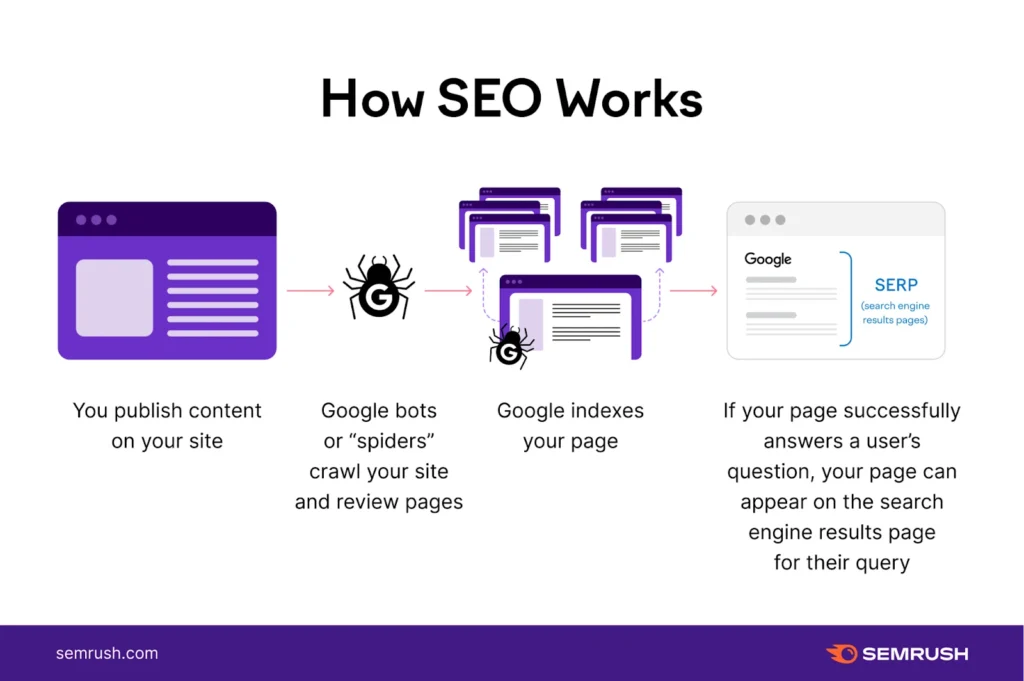
Source: SEMrush
Search Engines and Algorithms
Search engines like Google utilize complex algorithms to determine the ranking of websites in search results. Using successful SEO tools and conducting keyword research is essential for improving website rankings. These algorithms consider various factors to provide users with the most relevant and high-quality content for organic search and utilize search engine optimization and SEO tools to rank well on search engines.
Website Optimization
SEO involves optimizing website content and structure through keyword research, backlinks, and meta descriptions to align with search engine algorithms. This includes improving web page site speed, creating high-quality content for digital marketing, and enhancing user experience through responsive design for organic search page SEO.
Significance of Keywords
Keywords and backlinks are fundamental aspects of SEO, as they help Google understand the relevance of a website’s articles to specific topics. Proper keyword research and integration into website content can significantly impact its visibility in search results. This is crucial for on-page SEO and local SEO, as it helps to rank higher on Google.
Importance of SEO in Digital Marketing
Enhances Brand Visibility and Credibility
SEO, or search engine optimization, plays a crucial role in enhancing brand visibility and credibility through organic search and content marketing efforts. Optimizing the website’s content with relevant keywords, structure, and backlinks, ensures that the brand appears higher in search engine results pages (SERPs) and improves SEO.
This is crucial for marketing and promoting articles effectively. When a website consistently ranks higher for relevant search queries, it builds trust and credibility among users. This is crucial for improving page SEO and boosting Google ranking through effective content marketing.
Drives Organic Traffic to Websites
One of the primary functions of SEO is to drive organic traffic to websites, which is crucial for effective content marketing and search marketing. It involves optimizing websites to rank higher on search engines like Search Engine Land. Through effective keyword optimization and marketing, high-quality content creation, link-building strategies, and Google algorithms, SEO helps attract users who are actively searching for products or services related to the business.
This organic traffic not only increases the chances of conversion but also reduces dependency on paid advertising. It is a crucial aspect of effective content marketing and search marketing, as it improves page SEO and visibility on search engines.
Crucial for Staying Ahead of Competitors in the Digital Space
In today’s competitive digital landscape, SEO and content marketing are crucial for staying ahead in search engines. Utilizing relevant keywords and monitoring performance through the search console is crucial for success. Businesses that invest in robust SEO strategies and content marketing have an edge over those that neglect it. According to Search Engine Land, using relevant keywords is crucial for visibility on search engines. By constantly improving their website’s visibility, relevance, and user experience, they can outperform competitors in Google search rankings for content marketing and SEO and attract more potential customers using relevant keywords.
Key Components of a Strong SEO Strategy
Content Quality is Key

Source: LinkedIn
High-quality content is essential for effective SEO. Search engines prioritize valuable, relevant, and original content. This includes using relevant keywords naturally within the content to improve SEO and Google search engine visibility and marketing through links.
Impact of User Experience
User experience greatly influences the success of a search engine optimization (SEO) strategy, as it impacts content marketing and is a key factor in search engines’ algorithms. It’s essential to monitor user experience metrics through tools like Search Console, Clarity, and Google Analytics and stay updated with industry insights from Search Engine Land. Factors such as website speed, mobile-friendliness, easy navigation, and optimized pages contribute to a positive user experience and help improve search engine rankings through SEO. Search engines consider these aspects when ranking websites but not limited with these aspects.
Vital Role of Backlinks
Backlinks play a crucial role in SEO success. They act as “upvotes” for a website, signaling its credibility and authority to search engines, especially Google, through the use of links and strategically placed keywords for SEO. Quality backlinks from reputable websites can significantly boost a site’s ranking on search engines. According to Search Engine Land, these backlinks are crucial for SEO and can improve the visibility of specific pages.
Understanding these key components, such as keywords and links, is vital for creating an effective SEO strategy that drives organic traffic and improves visibility on search engines.
On-Page Optimization Techniques
Meta Tags and Descriptions Impact
Meta tags and descriptions are crucial for on-page optimization, as they help improve the website’s visibility to search engines and enhance its SEO. Including relevant keywords in these tags and descriptions is essential for ranking higher in search engine result pages.
Keywords play a crucial role in providing search engines like Google with information about the content of webpages, influencing their visibility in search results. Links also contribute to the visibility of pages.
Note: Apart From the Ranking Signal It also improves the CTR in SERP Snippet.
Content Relevance and Keyword Placement
Content relevance and strategic keyword placement are essential for on-page optimization. Ensuring that the right keywords are incorporated into the website’s pages is crucial for effective SEO. Creating high-quality, relevant content around targeted keywords helps SEO and Google understand the page’s purpose and rank it appropriately. This includes optimizing pages and building links to improve search engine rankings.
Eg: Even reputed Ecommerce sites are using content and keywords efficiently at the bottom of the pages.
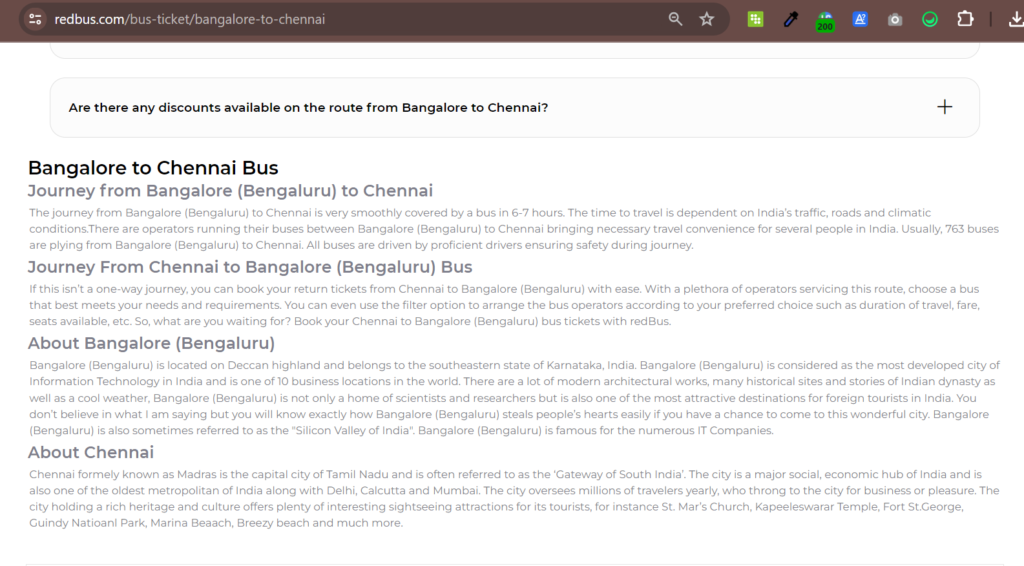
Source: Redbus

Source: Flipkart
URL Structure Role
The URL structure also plays a significant role in on-page optimization, especially for website pages and links, contributing to SEO. A clear, descriptive URL with relevant keywords can improve the website’s SEO and make its pages more user-friendly. Including links to relevant pages can also enhance the website’s visibility.
Eg: https://www.flipkart.com/clothing-and-accessories/topwear/tshirt/men-tshirt/
In the previous section, “Key Components of a Strong SEO Strategy,” the focus was on understanding the foundational elements of an effective SEO strategy, including keywords, content, links, and website. Now, delving into on-page optimization techniques provides insight into specific SEO tactics to enhance a website’s visibility in Google search engine results pages.
Applying SEO meta tags and descriptions strategically, ensuring website content relevance with well-placed keywords, and structuring URLs effectively are fundamental aspects of optimizing web pages for improved Google search engine performance. This helps attract users to the website. These techniques contribute to enhancing a website’s online presence by making it more accessible to both search engines and users seeking relevant information. By optimizing for keywords, SEO practices help improve a website’s visibility on Google and its ranking on pages.
Effective Link-Building Strategies
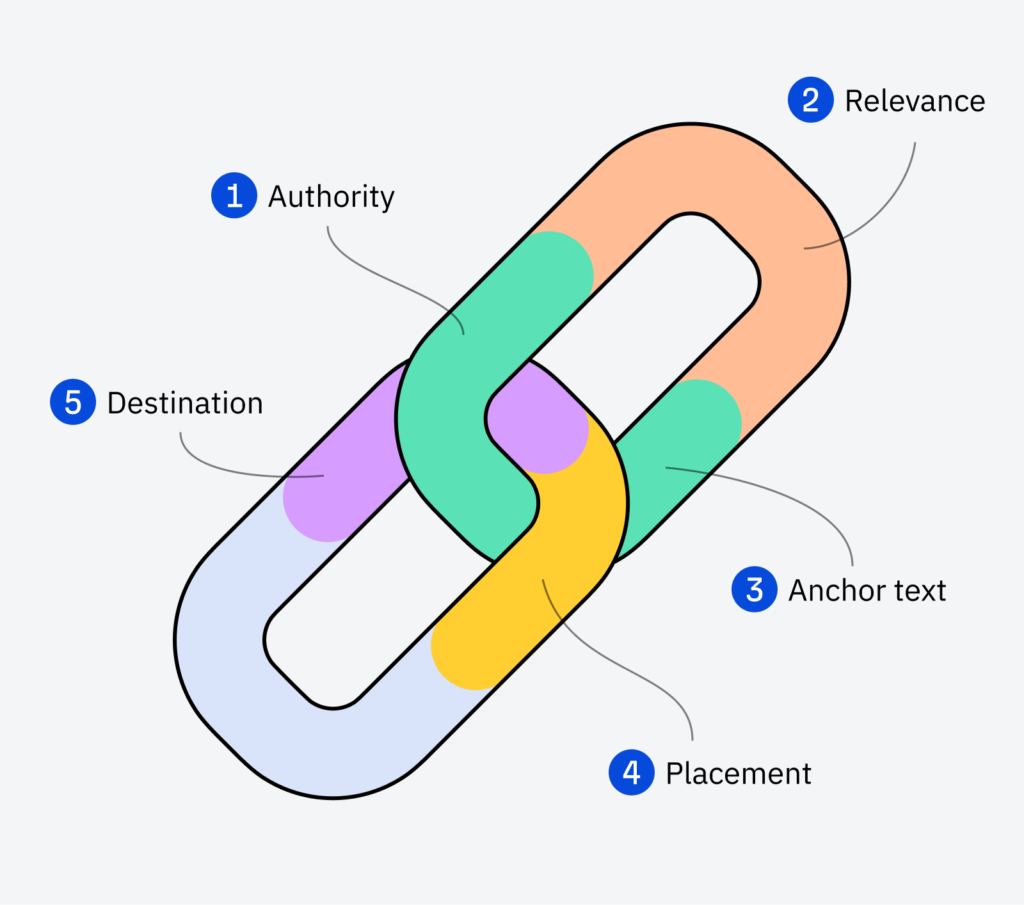
Quality Over Quantity
Emphasizing quality over quantity is crucial in link building. It’s better to have a few high-quality backlinks from authoritative websites than numerous low-quality ones for SEO. Quality backlinks can improve the ranking of web pages in Google search results by targeting relevant keywords.
Diverse Backlink Sources
Diverse backlink sources contribute to stronger strategies. Obtaining links from various reputable websites, such as industry-specific directories, guest posts, and resource pages, helps establish credibility and authority for SEO. It also improves visibility in Google searches and enhances content optimization with relevant keywords.
Guest Blogging
Guest blogging can be an effective link-building tactic. By contributing valuable content with relevant keywords to other websites within the same niche, it’s possible to earn SEO-friendly backlinks while also increasing brand visibility and establishing thought leadership on Google search pages.
In the previous section on “On-Page Optimization Techniques,” the focus was on optimizing individual web pages for search engines by incorporating relevant keywords to improve Google SEO and website ranking. Understanding how SEO works involves effective off-page strategies like link building to improve site pages’ ranking on Google. It’s essential to delve into keyword optimization.
Significance of Keyword Research

Source: SEMrush
Informs Content Creation and Optimization
Keyword research is essential for informing the creation and optimization of content for websites, particularly for improving Google SEO and increasing the visibility of web pages. It helps to identify the most effective keywords to use in the content.
By identifying the most relevant keywords, website owners can tailor their content to match the search queries of their target audience, thus increasing the likelihood of appearing in Google search results. SEO is essential for optimizing pages to use these keywords effectively.
Valuable Long-Tail Keywords
Long-tail keywords are highly valuable for targeting specific audiences in SEO. They help improve the ranking of pages on Google search. These longer, more specific keyword phrases allow websites to attract visitors who are looking for precisely what they offer on their Google search page and improve their SEO. For example, rather than focusing on “shoes,” a website could gain more from targeting “affordable running shoes for women” to improve its Google SEO and rank higher on the page.
Understanding Search Intent
Understanding search intent is critical in keyword research. Understanding the reason behind a user’s search query is crucial for optimizing content for Google SEO. Whether users are seeking information, looking to make a purchase, or trying to find a specific website, incorporating the right keyword is essential. By aligning SEO keywords with Google search intent, websites can ensure that their content meets users’ needs and ranks higher in search engine results pages.
Search Intent Types: Informational, Navigational, Transactional and Commercial.
Technical SEO Best Practices
Website Speed and Performance Impact
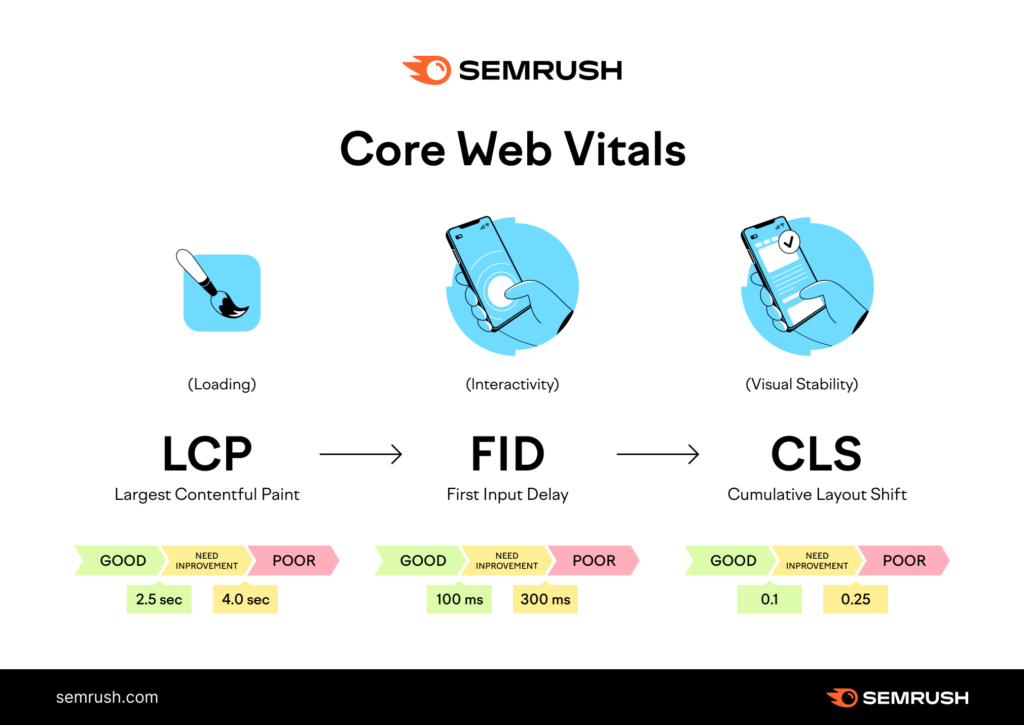
Fast website speed and optimal performance are crucial for technical SEO. It’s important to ensure that the content is relevant and high-quality to rank well on Google’s search page. Search engines like Google prioritize websites with quick loading times, as it enhances user experience and reduces bounce rates.
This is crucial for SEO as it impacts page ranking, user engagement, and the overall performance of the website’s content. Slow websites can negatively impact SEO, Core Web Vitals, and Google search rankings, making it essential to optimize images, minimize HTTP requests, and leverage browser caching for improved website speed and keyword optimization on the page.
Proper Site Structure Contribution
A well-organized site structure significantly contributes to technical SEO success. It helps search engines understand the page content and the keyword relevance, which in turn improves Google’s ranking. Clear navigation and logical hierarchy are crucial for effective SEO. They make it easier for Google crawlers to index content based on keywords and improve page ranking. By creating a sitemap and utilizing internal linking, websites can enhance their technical SEO. Implementing breadcrumb navigation provides a seamless browsing experience for both users and search engines, improving the Google ranking of the page content.
Mobile Responsiveness Importance
Mobile responsiveness plays a critical role in technical SEO. With the majority of internet traffic coming from mobile devices, search engines prioritize mobile-friendly websites in their rankings for Google SEO. It’s important to optimize your website with relevant keyword usage to improve your page ranking. Implementing responsive design techniques is crucial for SEO as it ensures that web pages adapt to various screen sizes, offering an optimal viewing experience across all devices. This is important for site content to rank well on Google. This not only improves user engagement but also positively impacts a website’s search engine visibility, particularly on Google’s search results page through effective SEO and relevant content.
Mobile-Friendly Website Best Practices
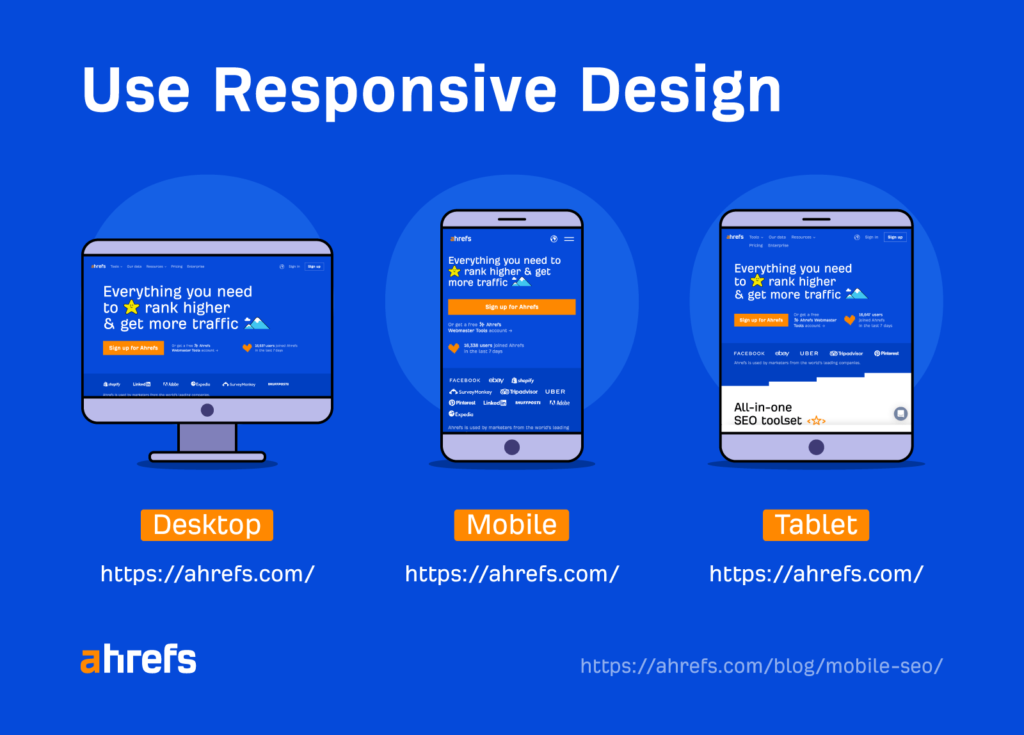
Source: Ahrefs
Mobile-First Indexing Impacts Website Rankings
Mobile-first indexing means Google predominantly uses the mobile version of a site for ranking and indexing, which can impact a website’s SEO and search page content. This change emphasizes the significance of having a mobile-friendly website for SEO.
Google prioritizes mobile-friendly pages with relevant content. Websites that are not optimized for mobile may experience a drop in their Google search rankings. This can be due to poor SEO, as Google prioritizes mobile-friendly page content.
Mobile Friendly Test Tool By Google – https://developer.chrome.com/docs/lighthouse/overview/
Responsive Design Enhances User Experience on Mobile Devices
Having a responsive design is crucial for SEO, as it ensures that your website adapts to different screen sizes, providing an optimal viewing experience for users across various devices. This is important for Google rankings as it enhances the user experience and content accessibility on the page. By implementing responsive design, websites can maintain consistency in content and layout regardless of the device being used. This is essential for improving page ranking on Google’s search engine results pages and boosting SEO.
Optimizing Images and Videos for Mobile Improves Site Performance
Optimizing images and videos for mobile devices is crucial for improving site performance, especially for SEO and Google page content. Compressing images and utilizing formats suitable for mobile can enhance loading speed, leading to a better user experience and improved SEO for your site on Google’s search page. Using lazy loading techniques can defter offscreen images or videos from loading until they are needed, further optimizing site performance for SEO and improving page load times, which can positively impact Google’s ranking of your content.
Conclusion
Understanding how Google SEO works is crucial for optimizing content on your site’s pages. From on-page optimization to effective link building and technical best practices, every element plays a significant role in improving a website’s visibility and ranking on SEO search engine results pages. Google’s algorithms highly value quality content. By implementing a strong SEO strategy that incorporates these key components, businesses can enhance their online presence and attract more organic traffic to their Google site content and page.
Staying updated with the latest SEO trends and best practices is essential for maintaining a competitive edge in the digital landscape. It’s important to optimize your site’s content to rank higher on Google’s page. By consistently refining and adapting SEO strategies based on industry changes, businesses can ensure long-term success in reaching their target audience and achieving their online goals.


